#waste disposal requirements
Explore tagged Tumblr posts
Text
even does know what plants are though. (as per doctor who canon, the way ships manage to keep oxygen on long voyages is via having literal forests in them. now, nothing to that extent, obviously, they weren’t that well-equipped or funded. but there’s definitely plants In There, probably relegated to a much more ordered existence, think the difference between a natural forest and one grown for logging.) at least they have that. they have seen plants. not often, but they have.
i don’t think they really understand plants beyond their functions (to eat, keep everyone breathing, etc.) whereas with natural beauties and animals and other such things that even has no experience with and can wonder over, they can’t really. do that with plants. the ability to admire a flower rather than immediately think of it in terms of resources lost and gained in its creation is a skill they have to learn.
but you know. at least they have seen them. that’s something. that’s slightly less depressing, right.
#even also would not know how to take care of plants. at most they know that plants require water. maybe.#their job was reconstituting the ship’s waste and recovering as much as they could and safely disposing of the rest#even doesn’t know to water plants. thank god the doctor doesn’t keep houseplants. they would die.#but i just think this would be an interesting contrast.#how easily even is taken in by things they’ve never seen before. and the few things they consider mundane. they have trouble looking at#with any emotion but Critically Thinking About How This Contributes To Us#the ever-present conflict of everything they learned to function as a part of a ship that was. not prepared. and responded to its lack of#preparedness by dehumanizing everyone on it and exploiting them until their death all for a future they couldn’t even be sure was there.#and the fact that they are delighted by the universe. they want to love it. they want to see it as beautiful. they want to escape.#and. what that means is that even thinks of flowers as wastes of space. long after they’ve gotten over a lot of their other ins#instincts about resource management and wasting it and such. they never really like flowers.#and that makes it kind of funny right? that it’s rose they have a crush on.#to them: rose is essential. so important to the doctor and so important - in their eyes - to the whole universe because of it.#idk where im going with this but its certainly a thing now#dw oc
3 notes
·
View notes
Text
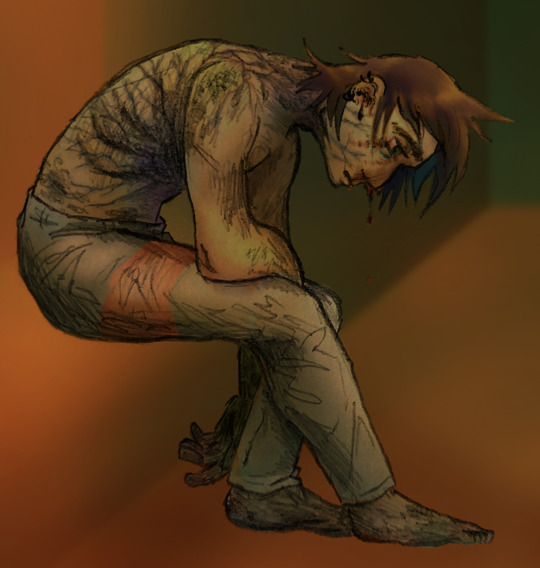
spent all last night creating a fictional disease so i might as well post this (insane ramblings in tags)
#my art#ocs#fuck backgrounds this is the best youll get from me#scroll down if you wanna see me ramble ab this#its called BHCD-1#its the product of a major corporation going unchecked and neglecting the bare minimum safety requirements for hazardous waste#basically this huge company that owns practically everything#controls all the food production in an america that is under a food scarcity crisis#this was brought ab due to temperatures being too high for regular food growth#but theres a limited ammount of space where food can be produced since it has to be in a controlled enviroment#so even this company is having trouble producing enough food to satiate enough people for there to not be regular cases of starvation#the company finds this backrooms esque place#which seemingly stretches endlessly#and figure thats a good place to utilize for food production as its a steady temperature with little variation#however they find this place filled with large quantities of this dark tarry waste product that they cant identify#maybe someone outside of their company would be able to but they keep it under wraps out of fear of getting shut down#they begin to recruit people with various environmental science degrees to dispose of the waste#figuring that they will be able to handle it better and that they can not have much competition or kickback this way#bc more people who've signed ndas means less people to dispute them once they eventually leave the company#also the company promises food security to the families of these prospective employees given they live on site and continue working#so new employees come in like crazy bc everyone is starving#and about a month into the cleaning operation someone gets sick#theyre discovered bc they seemingly had a nervous breakdown#the company realizes this is not the case and takes the person for observation#they die#the company is like oh shit and gives everyone pto#under the guise of training more employees#they dont tell anyone the person has died#they cut the person open and find their lungs are caked in the tarry substance they've been removing from the location#and had begun to leech to nearby tissue
4 notes
·
View notes
Text
Not to mention that when you buy into apples ecosystem, you're locking yourself into it. That's not to say that Microsoft Windows is truly any better than Apple OS, and in many cases, it's not. But lock yourself into Apple, and you'll be overpaying for sometimes lesser hardware and always at an inflated price. And when you already have 1 apple product it's so easy to just keep buying into their ecosystem.
we need to be teaching kids that macbooks are shit and dont do anything or else tiktok freelancers will make them think macbooks are good
#add#i wanted to add this but keep it short#be very careful about the wording for warranties and for repair options for your apple devices as well#there are several instances where the price from apple to repair your product is just the full price of the product AGAIN#which is egregious and awful#its how theyve tried to adhere to the new right to repair laws that are popping up#they adhere to it in such a gross manner that no one would use it. thus keeping them in control and your wallet on speed dial#longevity for any device is questionable because many companies are not focusing on longevity#the market moves so fast in tech these days#but along with many other companies apple participates in planned obsolescence#its a tactic they use to make older products slower. giving them a shelf life much shorter than it would otherwise#this is all just to grt you to buy into the latest technology#this is bad for so many reasons#like yeah this is bad because theyre making you pay them more frequently but this creates more electronic or e-waste in the world#and e-waste is a big problem as of late because companies like apple are left unchecked#the worst part about e-waste is the lithium. its a very rare metal and it requires proper recycling or disposal#and i guarantee lithium recycling isnt happening on the scale that it should#like many forms of cycling#ive been ranting about this in the notes for awhile
45K notes
·
View notes
Text
Life For Gaza: Each Cent Counts, Quenching the Thirst of Humanity in Gaza City
The Gaza Municipality is tasked with providing vital services such as water supply, waste management and sewage treatment. However, the widespread destruction in Gaza City has severely hampered the Municipality's ability to deliver even the most basic necessities to its residents. With limited access to water, the population faces a dire health and environmental crisis, especially affecting children.
By joining forces in this initiative, we cultivate hope and solidarity, fostering empathy and collaboration across communities while easing the hardships endured by those in Gaza. This collective effort reassures them that they are not alone in their struggle. The Gaza Municipality earnestly appeals for your support to help reinstate essential services, currently the foremost priority. In the northern regions of the Gaza Strip alone, over 500,000 individuals urgently require these services.
Where your donations will be directed:
- Water supply enhancement projects
- Maintenance of water wells
- Implementation of water desalination initiatives
- Management of waste collection and disposal systems
- Reconstruction of roads demolished during war
- Implementation of sewage water pumping and treatment schemes
- Execution of pest control and rodent eradication programs
1K notes
·
View notes
Text
"As the world grows “smarter” through the adoption of smartphones, smart fridges, and entire smart houses, the carbon cost of that technology grows, too.
In the last decade, electronic waste has become one of the fastest-growing waste streams in the world.
According to The World Counts, the globe generates about 50 million tons of e-waste every year. That’s the equivalent of 1,000 laptops being trashed every second.
After they’re shipped off to landfills and incinerated, the trash releases toxic chemicals including lead, cadmium, arsenic, mercury, and so much more, which can cause disastrous health effects on the populations that live near those trash sites.
Fortunately, Franziska Kerber — a university student at FH Joanneum in Graz, Austria — has dreamed up a solution that helps carve away at that behemoth problem: electronics made out of recyclable, dissolvable paper.
On September 11, Kerber’s invention “Pape” — or Paper Electronics — earned global recognition when it was named a national winner of the 2024 James Dyson Awards.

When she entered the scientific competition, Kerber demonstrated her invention with the creation of several small electronics made out of paper materials, including a fully-functional WiFi router and smoke detector.
“Small electronic devices are especially prone to ending up in household waste due to unclear disposal systems and their small size, so there is significant potential to develop a more user-friendly end-of-life system,” Kerber wrote on the James Dyson Award website.
“With this in mind, I aimed to move beyond a simple recycling solution to a circular one, ensuring long-term sustainability.”
Kerber’s invention hinges on crafting a dissolvable and recyclable PCB board out of compressed “paper pulp.”
A printed circuit board (PCB) is a board that can be found in nearly all modern electronic devices, like phones, tablets, and smartwatches.
But even companies that have started incorporating a “dissolution” step into the end life of their products require deconstruction to break down and recover the PCB board before it can be recycled.
With Kerber’s PAPE products, users don’t need to take the device apart to recycle it.
“By implementing a user-friendly return option, manufacturers can efficiently dissolve all returned items, potentially reusing electronic components,” Kerber explained.
“Rapidly advancing technology, which forms the core of many devices, becomes obsolete much faster than the structural elements, which are often made from plastics that can last thousands of years,” Kerber poses.
PAPE, Kerber says, has a “designed end-of-life system” which anticipates obsolescence.
“Does anyone want to use a thousand-year-old computer?” Kerber asks. “Of course not. … This ensures a sustainable and reliable system without hindering technological advancement.”"
-via GoodGoodGood, September 13, 2024
#ewaste#e waste#e waste recycling#e waste management#e waste solutions#paper#sustainability#green tech#tech news#sustainable technology#recycling#good news#hope
587 notes
·
View notes
Text
The Gaza Municipality is tasked with providing vital services such as water supply, waste management and sewage treatmentl. However, the widespread destruction in Gaza City has severely hampered the Municipality's ability to deliver even the most basic necessities to its residents. With limited access to water, the population faces a dire health and environmental crisis, especially affecting children.
By joining forces in this initiative, we cultivate hope and solidarity, fostering empathy and collaboration across communities while easing the hardships endured by those in Gaza. This collective effort reassures them that they are not alone in their struggle.The Gaza Municipality earnestly appeals for your support to help reinstate essential services, currently the foremost priority. In the northern regions of the Gaza Strip alone, over 500,000 individuals urgently require these services.
Where your donations will be directed:- Water supply enhancement projects - Maintenance of water wells - Implementation of water desalination initiatives - Management of waste collection and disposal systems - Reconstruction of roads demolished during war - Implementation of sewage water pumping and treatment schemes - Execution of pest control and rodent eradication programs

654 notes
·
View notes
Text
Books by Margaret Atwood, Judy Blume, Rupi Kaur and Sarah J Maas are among 13 titles that the state of Utah has ordered to be removed from all public school classrooms and libraries. The books on the list were prohibited under a new law requiring all of Utah’s public school districts to remove books if they are banned in either three districts, or two school districts and five charter schools. Utah has 41 public school districts in total.
They're not exactly burning books in Utah, but they are throwing them into dumpsters.
banned materials must be “legally disposed of” and “may not be sold or distributed”. PEN America Freedom to Read programme director Kasey Meehan said that such “vague” guidelines will “undoubtedly result in dumpsters full of books that could otherwise be enjoyed by readers”
What a fucking waste.
Utah residents! Maybe you wanna look into this terrible plan to waste tax money while also banning hugo award winning authors like Margaret Atwood?
151 notes
·
View notes
Photo

Jomon Period
The Jomon Period is the earliest historical era of Japanese history which began around 14500 BCE, coinciding with the Neolithic Period in Europe and Asia, and ended around 300 BCE when the Yayoi Period began. The name Jomon, meaning 'cord marked' or 'patterned', comes from the style of pottery made during that time. Although the entire period is called Jomon, various phases can be identified based on the style and intended use of the pottery.
Settlement & Subsistence
The people that came to what would be known today as Japan first did so near the end of the last glacial period, or Ice Age, most likely while following animal herds over land bridges formed during the glacial period. When the climate warmed and the land bridges disappeared, the soon-to-be Jomon people found themselves on an island. With the animal herds cut off from their homelands dying off, the Jomon people utilized hunting and gathering to fulfil their needs. Their diet has been found to consist of bears, boars, fish, shellfish, yams, wild grapes, walnuts, chestnuts, and acorns. Evidence of their diet was found inside middens, domestic waste disposal piles, and shell mounds that were found near villages.
Starting around 5000 BCE, the Jomon developed a more sedentary lifestyle settling into villages; the largest one at the time covered around 100 acres (c. 0.4 km²) and had about 500 people. Villages near the sea would have relied heavily on fishing while settlements further inland adopted a primarily hunting lifestyle. In many villages, what are assumed to be ceremonial stone platforms and storage pits have been found. The initial simple shelters of the villages would soon develop into pithouses built around a central fireplace, with a structure supported by pillars, accommodating around five people each. The Jomon people would settle in different areas depending on the changing climate; colder periods would require proximity to the sea as evidenced by much larger mounds of shells and fish bones found compared to warmer periods when the settlement pattern shows a shift to further inland sites in order to take advantage of the flourishing flora and fauna.
Along with the change in habitation, the total population underwent significant fluctuation: by 5000 BCE the population would grow from 20,000 to 100,000, only to grow further to 200,000 by 3000 BCE before falling back to 100,000 by the end of the period. Although the Jomon people had a somewhat sedentary life, the agricultural revolution only came with the introduction of rice farming near the end of the Jomon Period. This was around 900 BCE when along with advanced metalworking techniques rice was brought to southwestern Japan from what is today Korea.
Continue reading...
106 notes
·
View notes
Text
Death Work: Animal Remains
In my practice, I use remains, mainly animal bones, to connect with spirits, connect with Death, and in magical workings. Just recently, I’ve taken 3 more animals under my wing, and I thought it would be nice to detail my process of finding, handling, and working with remains as I actually initiate that process. Beginning first with finding remains and initial contact. As a death worker, I strive to honor the deceased and aid them in their transition, as well as bond with Death and use death and decay in magical practices. I have been doing spirit work for as long as I can remember and have begun learning under a few entities how to properly assist and tend to The Dead. As such this is not a “how-to”, just me sharing my beliefs but I’m open to questions and discussion :)

Finding Remains
If setting out with the intention of finding remains, it’s important to be prepared. It’s not a fun experience finding something and not being able to take it then, only to come back and it’s gone. Nor is it a good idea to grab things barehanded. I always have a bag with me packed with disposable gloves, trash bags/old shopping bags, and a mask (death reeks!). And if you don’t end up finding anything you can pick up any trash you come across !! I also make sure to bring offerings so I can leave them where I find remains, as well as personal ritual items used in funerary rituals. A hagstone has also always seemed to bring me luck on my searches :)
Where animals live, animals will die. Forests, wooded areas, creeks, wetlands, large areas without much human activity. You typically won’t find much in areas with heavy foot traffic or human presence. It’s good to find areas with lots of game trials, typically I find remains a little bit off from them. If the area has a lot of deadfall, fallen leaves, or snow, it’ll be a lot harder to spot remains. I’ve also had a lot of luck finding small bones and fossils on the banks of rivers, ponds, and lakes. Be wary of fresh or actively decaying corpses, there is a lot of bacteria and the animal itself can be carrying diseases. Always use protective gear when handling remains until they are completely sanitized.

Code of Conduct
While everyone holds varying ethical and moral beliefs, there are a few important issues I believe people should be aware of.
It's important to try you're best to not disturb other animals while searching. Respect the living as well as the dead. Personally, I don't hunt or otherwise intentionally kill animals but I understand the use. However, I do believe that the whole animal should be put to use and not left to waste. In death work, more often finding animals dead than not, this translates as never taking things that animals/bugs could eat or that you will not use. Nothing should be thrown away in the trash, I believe it is really disrespectful to chuck something like that into a garbage bag when leaving it outside would require minimally more effort. The nutrients of every organism deserve to go back to the soil.
Laws
Many places have laws that protect certain species. For example, the remains of native birds are usually legally protected in the US. Many endangered and at-risk animals are also protected. Even retrieving roadkill is illegal in some places! However, many places fail to impose proper protections on many animals that desperately need it. Always do your research on your local laws and the status of species in your area. Do not trophy hunt irl or online!
Sourcing
I haven't ever bought remains and don't plan to any time soon. I believe that if I'm meant to find it, it'll find me one way or another. Purchasing remains can be fine and ethical, but there are many situations in which it is not. A lot of remains, especially bones and furs, are not ethically sourced. Meaning mass farming, mass trapping, poaching, and cruel killing methods. It's important to know how remains were sourced, especially if one intends to bond with the spirit. Foxes, reptiles, cats, dogs, and skulls (in general) can be easily found on sites like Etsy, The Bone Room (avoid this site!!), and many real-life oddity expos where they 100000% source remains in either illegal or highly unethical ways. If a site sells illegal or endangered animals (bats, wolves, native birds, etc), cheap animals in bulk, or human remains then it is probably best to steer clear! Some Etsy shops will even title their listings as things like “man’s best friend” to try to get around the legality of selling dog remains among other species.
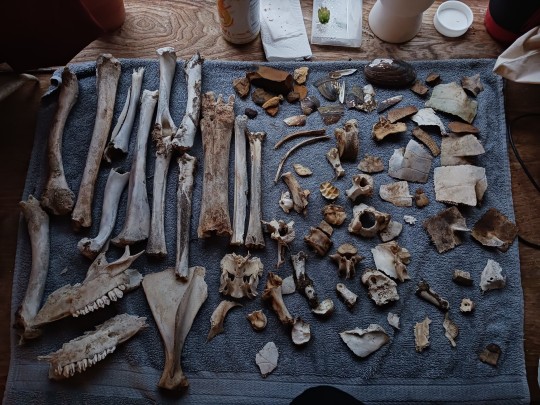
Initial Contact
After first finding remains I intend to collect, I introduce myself and state my intentions. I then leave offerings and ask to relocate/remove their remains. I approach this in a sorrowful, empathetic manner until giving them a burial and cleaning the remains.
I feel it's very important to ask the spirit before doing anything with the remains. However, if it's roadkill or in a vulnerable area with lots of people, then it's more respectful to relocate it to a quieter place. After doing spirit work for a while, instead of verbally asking and then divining, it’s more of a vibe check for me. When asking a spirit to take their remains, you should state your intentions whether that be art, bonding with them, or magical workings. I do not believe that the shade of an individual is permanently attached to its remains, nor do I believe that the shade is trapped wherever its remains are. However, I also believe that every being should have the opportunity to rest undisturbed if it so pleases. If a spirit truly does not want you fucking with its remains, I believe it will let you know through nightmares, bad luck, illness, and reoccurring thoughts of guilt among other things. You should be willing to leave the decreased alone if it comes to that, but in my experience, there have been few times in which a spirit is both still “connected” to its remains and dislikes the idea of me possessing them. I reckon that animals hold little use to their physical remains after passing, dissimilar to humans who tend to still want autonomy. There have, however, been times when I’ve forgotten about remains (either waiting to be processed in bags or actively processing in a bucket) and get a wave of guilt and think “oh fuck I should pull the deer out of the tub.”
I believe it is very important to leave offerings for The Dead, especially if you are disturbing their remains. Offerings act as both an honoring act for the deceased and payment for the remains. Offerings left out in nature should always be biodegradable and should not be anything that could harm any creature that comes across it. Typically, I make small bundle-type offerings from rocks, shells, plants, and sticks. They can also be food/drink (that is commonly safe for the deceased animal you are offering to), written poetry, or drawn art (on safe paper with graphite).
In addition, I always promise The Dead a burial. A burial does not have to be a grave 6 feet deep, but in some fashion, a piece of the deceased should be given a quiet and safe resting place away from humans. Even if the shade isn’t “contained” in the remains, I hold the belief that it can act as a tether for a part of the soul (hence using remains for spirit communication), and the individual should have the option to rest in a quiet place rather than sitting on a shelf. A burial also ensures that the nutrients contained in the remains are given back to the Earth. Life is a gift that must be returned to where it came from for the cycle to continue – thou art dust and to dust thou shalt return. Along this line of thought, no part of a being should be wasted. Meaning returning unused skin, fur/feathers, bones/fragments, guts, and anything you have no use for. Even with water maceration, the nutrients in the water can be returned to the soil and eaten by bugs. The location of the burial should be somewhere in nature, away from human activity and off footpaths. They don't necessarily need to be buried, they could be placed in high grass or in thickets. Scavengers, bugs, and fungi will take it from there. Death and decay remain important aspects of nature that continue to nurture other critters and the soil itself.

Cleaning Remains
Cleaning is a devotional act really. I won’t go into the actual cleaning process here because it’s long and varied, but another time maybe (I mainly use water maceration). During cleaning, I follow several rules to ensure respect for the deceased. Most importantly, I don’t treat remains as a toy or something to gawk at. At one point, these were living individuals and my respect for them doesn’t stop as soon as their heart stops pumping. The remains are cleaned thoroughly and well taken care of to prevent damage. I make an effort to never mix bones from different individuals to maintain a level of autonomy and the practical reason of being able to keep track of who's who. With displaying, I try to give everything its own space. My twin fish are kept together in a jar (they r in luv) that serves as their spirit home, sometimes I will set offerings or candles beside it. TOO, I find it important to spend time with the remains if one aims to form a relationship with the spirits. Just a few days ago I took a few armadillo bones out with me for a walk in the rain, which may sound a little crazy to some but I can only hope that I can feel the rain and hear the thunder after I've passed.
The cleaning process is a long and hard one, it's a good time to bond with the remains. As you hold them in your hands, feel every inch of it. Feel the grooves, the textures, the weight, the temperature. Does it feel cold and hollow? Does it feel like a pit is forming in your stomach? Does it feel like a bright light is radiating off it? Do any memories, thoughts, or emotions arise? It is a good way to get to know the spirit/energy of the remains.

Working with Remains
I don't work with the spirit of every bone I find. That would be very difficult, and many don't have spirits attached to them much anymore. Remains can be used in magic, divination, offerings, and art. If I'm using remains as ritual tools, I will first bond with them, consecrate, and then continuously feed them. Just some of the ways remains can be used in death work and magic;
Connecting with Death
Connecting with the individual spirit or species archetype
Conjuring The Dead: I find that bones can be excellent wands used to call upon spirits. They can be really good tools for directing energy, especially for the earthly deceased.
Offerings to Chthonic / death associated entities: many of the bones I have, I've put on my altars for Hades, Hekate, and Lucifer. Not only because they represent death and are aesthetically fitting, but to place the deceased under the protection of those entities.
Bindings: I believe a hollow bone could be used for a good binding by placing taglocks and ritual ingredients into the hollowed center and sealing it up tight. Bones are strong and hard to break, whatever you put in them will have a hard time finding their way out. They take a very long time to decay, so if you buried it after binding someone, I reckon they'd be there for a long time. Bones are a physical representation of death so there could also be an opportunity for some nasty effects.
Spirit vessels: in a similar line of thought as bindings, bones are excellent for containing or homing spirits. Typically these are entities associated with the species the remains belong to.
Ritual tools and instruments: bone athames, wands, offering dishes, flutes, whistles, drums, containers, osteomancy sets, the list goes on.
Additionally, specific parts can represent certain things and can be useful in certain workings.
Teeth: teeth from predators/carnivores represent power, defense, and protection. They are well suited for protection talismans, wards, and asserting dominance over others.
Claws: similar to teeth, claws can be used as strong protection charms.
Skulls: I would say the skull is the defining bone of an individual. The seat of the mind, consciousness, and all perception. Skulls can be used to bond with spirits or keep away spirits, similar to how a jack-o-lantern works.
Rabbit feet: rabbit feet are popularly considered lucky charms. You can also use them to help you navigate situations quickly and bring about fertility and abundance.
Chicken feet: chicken feet are commonly turned into protective amulets. They usually have long, sharp claws perfect for scratching back at anyone who tries to harm you.
Tongues/eyes/ears/brains: these structures supply us with our sensory perception and are vital parts of most species. They can be used to draw upon psychic abilities (eyes for clairvoyance or visions, brains for claircognizance). They can also be used to dampen the senses, such as tying, binding, or pinning a tongue to shut someone up.
Heart: often used to represent emotions like love. Can be used in love spells or to hurt someone emotionally.
Liver: a common form of divination in the ancient world was to slaughter an animal and then interpret patterns and markings on its liver. This is actually something I find fascinating, look into Mesopotamian liver divination and hepatoscopy!!
Shed skin: shed skin from snakes, reptiles, and bugs can be used to represent change, renewal, enlightenment, and letting go by "shedding your old skin".
Antlers: antlers often represent strength and power as animals will use them to fight with each other and assert their dominance over their territory. Small ones could be fastened to bags and be used as protective charms. They can also be made into wands or protective pendants.
Shells: I've always associated shells with protection since that is their purpose. I often use a powder made from ground shells to pour along the edges of rooms or windowsills.
Scapula: Interestingly, used in many belief systems and cultures for divination. Scapulimancy is the divinatory use of scapulae by interpreting post-mortem markings, or markings/cracks on the bone made by holding it over a flame. Another divinatory use found in old necromantic manuals, specifically the Munich Manual, is using the scapula as a scrying mirror by anointing it with magical oils and conjuring spirits in the reflection.
Turtle plastron: used alongside scapulae in Chinese divination, the querent would paint or carve their question into the bone, drill evenly spaced holes, and then hold it over a flame and interpret the cracks or burn marks.
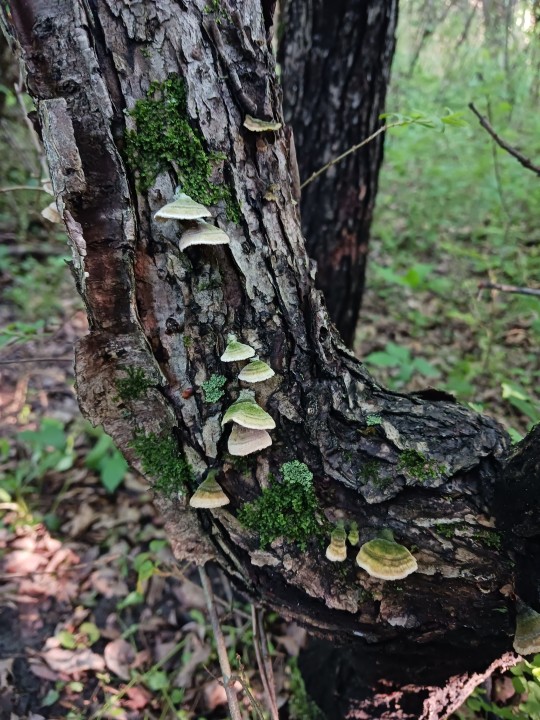
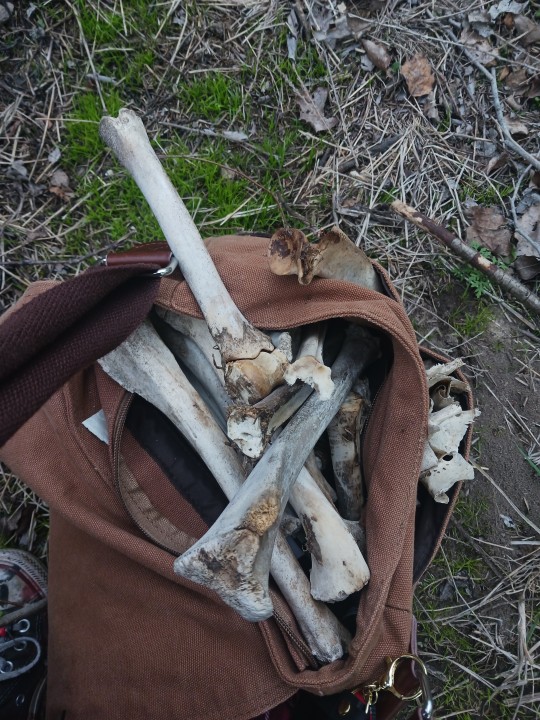
159 notes
·
View notes
Text
A Decade Of Doom!
I started this blog ten years ago to compile the growing evidence that our planet would not longer be able to sustain human life by 2050, thanks to our continued, capitalist-fueled efforts to destroy all the systems we rely upon to sustain life. The first thing I put up here was this essay, on February 20, 2014. Now, a decade later, I thought it might be "fun" to look at what's changed: 1) Earth Overshoot Day
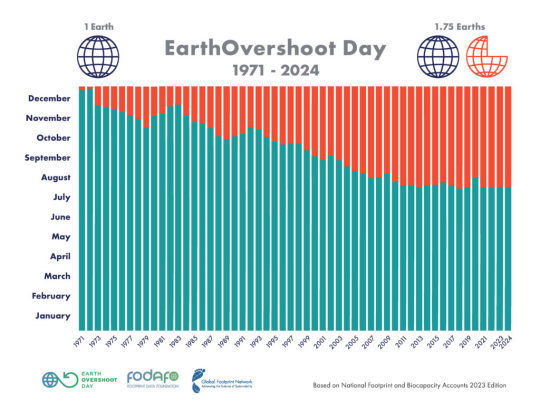
In 2014, "Earth Overshoot Day" (the day that humanity collectively consumes more resources from nature than it can regenerate over a year) was August 19th. Now, in 2024, Earth Overshoot Day is August 1st, 2.5 weeks earlier. At this rate and assuming things don't accelerate (even though they are likely to), Earth Overshoot Day will be around June 17th by 2050. 2) Biocapacity Biocapacity is the amount of resources contained on the planet required available to sustain life, measured by area. In 2014, I calculated that the planet had a biocapacity of 1.7 hectares per person. By dividing the total available biocapacity today in 2024 with the current global population as I did then, it now appears that there are just 1.5 hectares of planetary resources left per person to extract all the materials needed to sustain life, as well as all the area available to dispose of waste. That's a 12% loss over ten years. At that rate, we can expect to lose another 30% of biocapacity by 2050, going down to just 1.05 hectares per person by then, and that's assuming that the rate of biocapacity loss does not accelerate further and that the global population suddenly stops increasing after a run of non-stop increases spanning five centuries. Oh, also a reminder that the average human requires 2.7 hectares of land to sustain its current consumption habits/levels. So. 3) Individual Conservation To illustrate the futility of individual conservation at this point in the apocalypse, let me give you an example: If you were: a fully-vegan localvore living in a one-bedroom apartment with nine other people and using 100% renewably-generated electricity; who did not ever use motorized transportation of any kind or buy new clothing, furnishings, electronics, books, magazines, or newspapers and recycled all the waste you generated that was recyclable, you'd only require 1.4 hectares of biocapacity to sustain yourself. That is close to the kind of lifestyle extremism it would take to live sustainably. Deviate from that level of stoicism even slightly (say by living in a two-bedroom apartment with three other people instead of a one-bedroom apartment with nine other people and taking a single, four-hour roundtrip flight, once a year) and you're now consuming 1.6 hectares of biocapacity, which means you're using more resources than the world has available for you if everything was divided evenly among everybody. Of course, biocapacity, like all resources, are not divvied up evenly among everybody, which is why there are currently 114 different armed conflicts happening worldwide - the highest number of armed conflicts since 1946. 2023 was the most violent year in the last three decades. 4) Other Signs Of The End Times In my 2014 essay, I referenced the work of geologist Dr. Evan Fraser, who studies civilization collapse. In his book Empires of Food, Dr. Fraser noted common signs of a civilization about to collapse, which began to appear about two decades before it all goes completely to hell. Those signs were: -a rapidly-increasing and rapidly-urbanizing population We've added 700 million people to the planet since I began this blog in 2014. And where is everyone moving to?
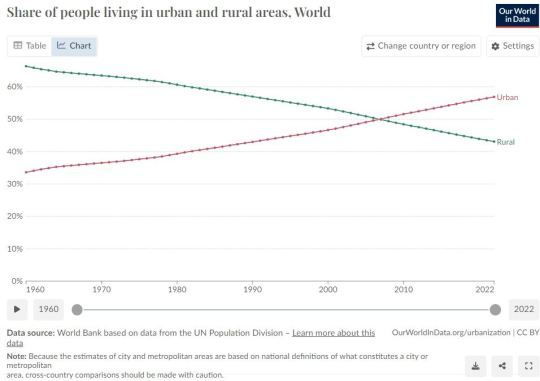
-farmers increasingly specializing in just a small number of crops " "As farm ecosystems have been simplified, so too are the organisms that populate the farm. A farm that specializes in a limited number of crops in short rotations does not, for example, look for plant varieties that do well in more complex rotations with intercropping. A beef feedlot operation wants breeds that gain weight quickly on grain diets and does not want cattle breeds that digest well pasture grasses and thrive in all year outdoor environments on the range." The result? Recent estimates put the loss of global food diversity over the last 100 years at 75%. Over the 300,000 species of edible plants that exist, humans only consume about 200 of them in notable quantities, with 90% of crop plants not being grown commercially. -endemic soil erosion Climate change and the need to raise more crops have combined to increase the rate of agricultural soil erosion globally. Back in 2014, when I started blogging about the end of everything, the UN had already determined that there was only enough fertile soil left to plant 60 more annual crops. So, by 2074, we won't be able to grow food, full stop. This of course comes at a time when the global population continues to increase, and with it the need to grow more food. If projections are accurate, we will need to increase food production by 50% over the next three decades to feed everyone. -a dramatic increase in the cost of food and raw materials When I started this blog in 2014, I noted that 2011-2013 had seen the highest food prices on record. So what's happened since then?
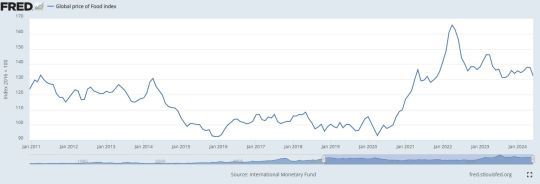
It's important to point out here that the current food price spike started in 2020, so if Dr. Fraser's calculations are correct, the food system will collapse sometime around 2034, taking civilization with it. I closed my debut essay on this blog with a quote from the (now deceased) climate scientist Dr. James Lovelock, who advised a Guardian journalist to "enjoy life while you can. Because if you're lucky it's going to be 20 years before it hits the fan." That interview was published in 2008. We have four years left to enjoy.
#doomsday#human extinction#apocalypse#climate change#global warming#capitalism#civilization collapse
98 notes
·
View notes
Text

𝐎𝐬𝐜𝐚𝐫 𝐈𝐬𝐚𝐚𝐜 𝐂𝐡𝐚𝐫'𝐬 𝐀𝐬 𝐓𝐞𝐚𝐜𝐡𝐞𝐫𝐬
Characters: Steven Grant, Nathan Bateman, Llewyn Davis, Jake Lockley, Blue Jones Summary: Oscar Characters characters teaching subjects at school. Warnings: None WC: 1.7k



𝗦𝘁𝗲𝘃𝗲𝗻 𝗚𝗿𝗮𝗻𝘁 - 𝗛𝗶𝘀𝘁𝗼𝗿𝘆

His natural passion and accidental ability to hyper-fixate on things means he can teach all the required topics with ridiculous detail, but we all know which subject he dominates best.
The vast majority of the students adore him. Mr Grant’s lessons are always fun, he lets the class make posters (that include all nine members of the Ennead), do Kahoot quizzes, create live re-enactments of historical events. Even when he’s just talking off a power point, his voice, mannerisms and tendency to act things out has the children engrossed and giggling.
The classroom walls are absolutely littered with posters, some bought and some done by students. There's inspiring quotes, positivity kittens and Egyptian puns.
Not only is he a good teacher, but a good mentor. Being autistic himself, he notices any neurodivergent or “othered” kids and makes it a point to find what they’re passionate about and working it into their curriculum. If someones struggling he’ll arrange one-on-one time, asking them what they’re strengths are not just to help figure out how to work with them, but to remind them they have strengths.
While most students do love him, the few troublemakers know he’s not the strictest and thus will absolutely take the piss. Feigning ignorance and struggles as an excuse to why they missed a deadline or didn’t do the homework. Steven, the optimist he is, is always happy to give second, third and fourth chances. It does take that long for him to realise they’re not genuine, and yet he’ll still try, convincing himself that he’ll be able to turn them straight with the magic of friendship.
𝗡𝗮𝘁𝗵𝗮𝗻 𝗕𝗮𝘁𝗲𝗺𝗮𝗻 - 𝗖𝗼𝗺𝗽𝘂𝘁𝗶𝗻𝗴 𝗦𝗰𝗶𝗲𝗻𝗰𝗲
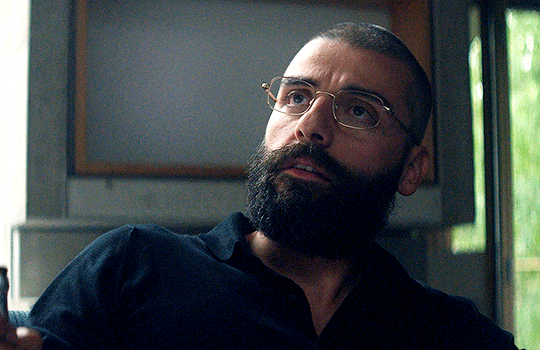
It would be like finding a needle in a haystack trying to find a single student in the many years Nathan had been teaching that didn’t, at least at one point, absolutely despise him. Mr Bateman was far from the friendliest, lax teacher to his students, bordering on a bit of an asshole really. He had an absolute zero tolerance policy for time wasting, messing around and not giving 100%. All students were expected to keep up, get the work done on time and spend time studying and completing exercises at home. If you didn’t do that, you weren’t trying hard enough.
The common conception of a hard-ass wasn’t ill fitting, but it wasn’t without reason. Mr Bateman was a hard-ass because he wanted his students to grasp every opportunity at their disposal and stretch their potential. Some people were born smarter, some learned quicker from a young age but every single person could better themselves regardless of whether they started at Level 10 or Level 0.
It also shouldn’t be said that he wanted students that simply obeyed. It was a story passed down to students about the time a student, in a fit of frustration and defiance to the teacher that always pushed them, completely disregarded the set code structure and wrote their own entirely new one that completed the aim function. While everyone would expect them to be given weeks worth of detention and a reaming, but Mr Bateman simply smiled, said well done and moved on with the lesson. Apparently the kid managed to get a full paid scholarship into top university, but that was just hearsay. Rumour has it his middle name is Hamlet too, snickering students will whisper.
Besides his rigid teaching style, not much is known about him. The classroom is minimalist, only a coffee flask and a pot of three black ballpoints sit on his desk. The walls are sparse beyond a handful of posters about common coding knowledge.
𝗟𝗹𝗲𝘄𝘆𝗻 𝗗𝗮𝘃𝗶𝘀 - 𝗠𝘂𝘀𝗶𝗰
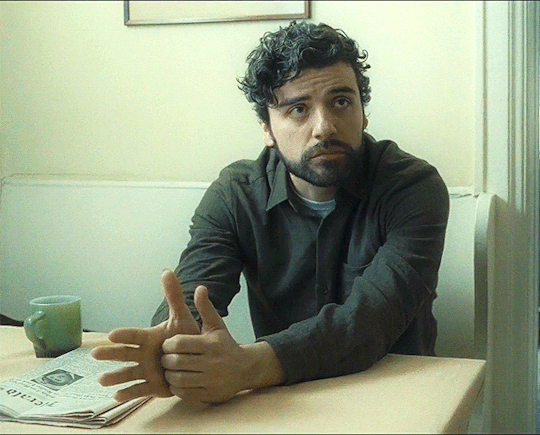
The beginning of every new school year followed the same routine. Kids would hear their music teacher was a published artist, get insanely excited, go to class then realise published was not synonymous with success and wither with disappointment. Mr Davis gave up caring years ago, at least he finally had a steady gig, albeit at the cost of his soul.
Classes were average. Sometimes students were treated to his natural singing voice, something that always sparked smiles and attention from the kids, but usually lessons were Llewyn bearing through kids bashing piano keys and drum pads as he wandered around and did his best to tutor them through it.
To kids that were required to take the class, it was alright. Mr Davis wasn’t a hard ass, although it did drain his soul to see kids blind to the brilliance and potential of music. His homework mostly consisted of practicing at home or listening to different genres. To kids that genuinely enjoyed music, it was bliss. Mr Davis was no dream mentor for sure, he was quite stubborn about what he thought “good music” sounded like, but when he sat with someone he could share the passion with, the kid would feel like an equal.
The classroom was always open to kids that wanted time to practice, he knew what an escape music could be, and would never hesitate to sit and work out a song or even add his guitar to whatever a student was playing.
The room was a riot on a good day. All sorts of instruments littered and surrounded the desks, posters of musicians and notes and the different types of brass instruments lined the walls and there was always something playing in the background. A basket of fruit and cereal bars was always sat fully stocked next to the door, with a “Help Yourself” sign stuck to it. No one knew why, and no one ever thought to question it.
𝗝𝗮𝗸𝗲 𝗟𝗼𝗰𝗸𝗹𝗲𝘆 - 𝗦𝗽𝗮𝗻𝗶𝘀𝗵
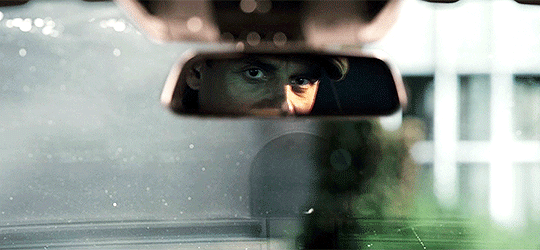
Spanish was always a full class, no matter what year or whether the students actually cared about Spanish. Students either swooned over him or wanted to be his friend. Mr Lockley knew, although had no clue why, but who cares as long as he was able to spread some Spanish around. The point is, Mr Lockley had no enemies at school.
Like a typical Spanish teacher, the register was taken in Spanish, if you wanted to ask to go to the toilet it had to be Spanish and if you wanted to pass notes in class they had better be in Spanish. He wasn’t the most forgiving, the man expected homework to be in on time and god help you if it was google translate. Mr Lockley would call you out, make you re-do it in his class at lunch or give detention to repeat offenders.
If students had been doing reasonably well he’d bring in some traditional Latin American foods for students to try, turn on a Spanish movie or even treat them to a little story about his past. Remember the Chef in Ratatouille that killed a guy with one thumb? That's the type of nonsense he talked about, albeit a bit more kid friendly. Most of the stories were embellished tales of him saving a grannies purse from being stolen, but some students always wondered about that hardened, broody looking teacher.
Mr Lockley prefers to keep his help to class time, long past learning his lesson about the very obvious students that came to him giggling and blushing behind their hands. On a rare occasion however, he will accept a student that comes knocking, overly apologetic and pleading for just a little help on their assignment, especially if the student is a quiet one. His lunch is set aside and he gestures for the student to take a seat before going over it with them, helping them with pronunciation, never shaming them or getting annoyed if they make a basic mistake. At the end he’ll even teach them how to say shit in Spanish, if they can keep it a little secret.
The classroom has posters of different Latin American countries, verbs and nouns, the different gendered terms. His desk was a little cluttered, a ‘Mejor Profesor’ mug, papers half marked and some drawings done by students hung nearby.
𝗕𝗹𝘂𝗲 𝗝𝗼𝗻𝗲𝘀 - 𝗖𝗵𝗲𝗺𝗶𝘀𝘁𝗿𝘆
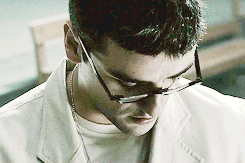
No one's favourite teacher but everyone knew him and had something to say. If a student had him later in the day they’d need to pray the morning classes were well behaved or pray they knew someone in said classes that could give a heads up on his moods. It didn’t matter either way, you could walk in one him sucking on his lower lip and glaring the entire class down and walk away with him smiling and patting backs. It was every student for themselves in that class. The only consistency was the white lab coat he wore.
There were obvious favourites, usually people who found a good balance of kissing his ass but not too overtly, asking for help while still expressing basic knowledge. If you asked too many questions, he would openly sigh or ignore you for someone else. If you gave an answer he thought was stupid, he wouldn’t hide the hands raking over his face in annoyance. If you were quiet and kept to yourself, you’d skirt by okay until one day in the middle of a lesson he calls your name with a faux chirp, predatory smile and ask a question. Answer correctly and you can rest assured he'll (probably) leave you alone for the next few lessons, answer wrong and enjoy doing exam questions as practice.
Detention for even a hint of a Breaking Bad reference. Openly hated a student named Jessie. Weirdly, students notice it's not the chemistry part that annoys him, it's the inaccurate portrayal of drug transactions and the costs. No one has dared ask why he knows so much about that.
Mr Jones’ door is usually locked at lunch and after class, he'll blatantly ignore any student that knocks and continue eating. On the stray chance a rare student manages to find him outside the class and has the balls to stop him, with his trademark sigh he'll begrudgingly set up a day and time to help them. It'll be a one-on-one session filled with eyerolls and being talked down to, but you'll get lots of extra knowledge and he'll even throw some of his old textbooks at you for free. Weirdly, he won't bother you in class anymore, just giving you a little smile out the corner of his eye.
The classroom has old periodic table posters from the teacher that retired years before him, and classroom rules about remembering to wear goggles or you'll go blind. The only thing on his desk besides several piles of paper is teacher mugs with variations of chemistry puns he pretends to hate.
231 notes
·
View notes
Text
Oregon governor Tina Kotek yesterday signed the state's Right to Repair Act, which will push manufacturers to provide more repair options for their products than any other state so far.
The law, like those passed in New York, California, and Minnesota, will require many manufacturers to provide the same parts, tools, and documentation to individuals and repair shops that they provide to their own repair teams.
But Oregon's bill goes further, preventing companies from implementing schemes that require parts to be verified through encrypted software checks before they will function, known as parts pairing or serialization. Oregon’s bill, SB 1596, is the first in the nation to target that practice. Oregon state senator Janeen Sollman and representative Courtney Neron, both Democrats, sponsored and pushed the bill in the state senate and legislature.
“By eliminating manufacturer restrictions, the Right to Repair will make it easier for Oregonians to keep their personal electronics running,” said Charlie Fisher, director of Oregon's chapter of the Public Interest Research Group, in a statement. “That will conserve precious natural resources and prevent waste. It’s a refreshing alternative to a ‘throwaway’ system that treats everything as disposable.”
Oregon's law isn't stronger in every regard. For one, there is no set number of years for a manufacturer to support a device with repair support. Parts pairing is prohibited only on devices sold in 2025 and later. And there are carve-outs for certain kinds of electronics and devices, including video game consoles, medical devices, HVAC systems, motor vehicles, and—as with other states—“electric toothbrushes.”
Apple opposed the Oregon repair bill for its parts-pairing ban. John Perry, a senior manager for secure design at Apple, testified at a February hearing in Oregon that the pairing restriction would “undermine the security, safety, and privacy of Oregonians by forcing device manufacturers to allow the use of parts of unknown origin in consumer devices.”
Apple surprised many observers with its support for California's repair bill in 2023, though it did so after pressing for repair providers to mention when they use “non-genuine or used” components and to bar repair providers from disabling security features.
According to Consumer Reports, which lobbied and testified in support of Oregon's bill, the repair laws passed in four states now cover nearly 70 million people.
272 notes
·
View notes
Text
unsurity (tartaglia)

words : 1.4k // childe x reader // fluff, narrative

you were always sure that tartaglia wouldn't notice you at all; he valued strength before anything and you weren't strong— at least not stronger than him— not strong enough to be even called an "outstanding" paladin. but the day he saw you defeat a bunch of fatui agents in chess and soon got defeated himself when he challenged you, you saw a switch flip in his eyes.
you were sure that you won't get any special attention from the harbinger; he always knew that you were a capable agent but you weren't anything worthy of his attention— after all, you were just a normal but clever agent; slowly but surely climbing up your ranks in fatui. but soon, he started to observe just how easy it is for you to learn even the most complex of plans, understand nexus of convoluted theories and researches and how easy it is for you, to put those said plans in action, even leading when required to.
you were sure that childe was a man who valued strength above all; yes, he was a straightforward, serpentine and a loyal man, but under that mask of friendly-outgoing man, was a war hungry lunatic, who swore his life to the tsaritsa, who survived on the lone adrenaline of battles and mysteries to be unfolded, a brute living with lust for bloodshed, it was hard to surprise him but— for him, you were a sweet enigma, a cerulean bead sewn with green ones.
you were sure that the ginger-haired male always knew more than he let on; he was a man of many talents after-all; may it be his negotiating prowess, diplomatic nature or simply his strength— you always assumed it impossible to surpass him. but one day, when you were left in charge on account of his absence and were still able to pull off the best deal (which even he might've had problem to get), the male was sure that there's obviously more to you than what met the eyes.
you were sure that the eleventh always assumed for people to bow to him— to be scared of him, like hello, as if he's not one of the most dangerous persons in the world— but, the day you sheepishly admitted that answering to the eleventh harbinger made you quite nervous, his eyes were wide with shock. the sole harbinger who was never known to exploit his sub-ordinates, if he could, he certainly became even kinder to them— rather than tripling their training in case of mistakes, he only doubled them now. well, it was still better than the way the other harbingers disposed of the weak links to their dungeons or simply put up their 'wanted' posters.
you were sure that a fighter like "lumine" would be the one to catch his eyes— she might just be a bit above average with her brains, but her brawns, connections and integrity compensated for everything else— you wondered if she was even stronger than the harbingers— which didn't seem too far-fetched a theory, she was an outlander after all. but she also hated the fatui, without caring about about their end goal; there were evil people everywhere, no? so why would she hold prejudice against every fatui member? you wondered just why it was hard for lumine to grasp that fact— yet, you chose not to say anything, you weren't in her shoes.
you were sure that your leader was head over heels for the traveller, calling anyone "comrade" was probably the highest honor he could present to anyone. you chuckled as you witnessed one or two of their ministerings, panicking slightly as you found his eyes catch yours as you watched them but you simply bowed and left, you sincerely wished for him to stay happy.
all talents are recognized by the tsaritsa and she certainly didn't let your talent go to waste, soon you climbed up the ranks to become an official diplomat from the nation of snezhnaya, you weren't just an agent anymore. your position didn't surpass that of harbingers but, you certainly didn't need to work under them anymore- you were also shocked to know that a few harbingers- la signora, the doctor and marionette had themselves vouched for your promotion. it scared you to the core, you weren't under childe's protection now- you were free, independent- but shackled enough for other harbingers to use you as a puppet for their missions- and you wouldn't have enough authority to deny them either.
you were sure of the fact that you were fucked when the doctor asked you to visit sumeru with him- to handle political and diplomatic issues from his behalf as he works on his own research- but, another harbinger had requested of your help at the same time and the tsaritsa deemed it more appropriate, to aide this other harbinger at work. the other work wasn't a piece of cake- none of your work is, but ningguang was quite hard to please, you would pray that you never negotiate with her again.
you were sure that no one would care to console you after your probably hardest mission till date- you were exhausted- spent, your brain felt fried. so when you felt a strong arm grip your shoulder you didn't even have enough strength to shake it away- honestly, you probably couldn't even if you were healthy. you tilt your head as you looked at the ruffled red locks- they seemed fluffy. you smiled as you stared up at him. "good evening, lord," you said as the harbinger smiled at you- passing you a coffee to drink- your favorite one too! you giggled as you took the drink from his hands, to exhausted to register what was happening in front of you as you grinned at childe.
"your girlfriend might get jealous, my lord."
you saw his brows quirk up quizzically as he stared at you, "what girlfriend?"
"lumine?"
"she's not my girlfriend- neither do i like her."
you were sure that this man was devoid of being vulnerable- yet when you sat next to him as he looked over at the red sunset over the white silky stretches of snezhnaya, you could feel him shiver- if only for a second. he chuckled as he closed his eyes and leaned back, "signora hated the chilly air, you know? now that i think, she hated the wind itself."
ah, so it was about her today,
"and the balladeer would scowl at me as i asked him to spar- sparring was perfect to not feel the cold."
so it is about both of them.
you simply nodded at your ex-boss, listening to him retell stories about his past days, with smiles and chuckles all along, until he falls silent- his eyes gazing at the shadow of what was the blazing red sun.
"at least one of them is alive- i am sure of that, he wouldn't die this easily."
you stared at your master as your hand involuntarily went over his, gingerly tracing small circles over his knuckles as he smiled. he didn't push your hand away and neither did he punish you.
"thankyou." was all that you heard.
you didn't expect him to drag you to snezhnaya's market at the break of the morning- on your holiday. and you certainly never expected him to loiter around the market, asking your opinions on clothes for his siblings that you haven't even seen before. he scrambled here and there for numerous souvenirs, rambling about how he can't return to morepesok empty handed.
he wasn't so cruel as to not reward you for making you work extra hard, he bought you a ridiculously expensive piece of gramet despite your protests and wrapped it around you by himself, singing praises of how you look even cuter now, and promised you to a fairly exquisite lunch too!
not before asking you to come with him- to morepesok.
you were sure that his eyes wouldn't linger on you for any longer than a few mere seconds. so when he stretched his hand across the table and held yours, you wondered if he was the "person of your dreams", someone you would readily give your heart to. you wonder if people like him, needed people like you. because you were always sure, that he'd never notice you, at least not for long.
maybe you were awfully wrong.

#genshin impact#anime#genshin x reader#tartaglia x reader#tartaglia x you#tartaglia#childe tartaglia ajax#ajax#childe x reader#childe#childe x you#childe tartagalia#childe genshin impact#genshin imagines#genshin fluff#genshin fanfic#nish recs : anime
158 notes
·
View notes
Text
Life For Gaza 2: Each Cent Counts, Quenching the Thirst of Humanity in Gaza City
The Gaza Municipality is tasked with providing vital services such as water supply, waste management and sewage treatment. However, the widespread destruction in Gaza City has severely hampered the Municipality's ability to deliver even the most basic necessities to its residents. With limited access to water, the population faces a dire health and environmental crisis, especially affecting children.
By joining forces in this initiative, we cultivate hope and solidarity, fostering empathy and collaboration across communities while easing the hardships endured by those in Gaza. This collective effort reassures them that they are not alone in their struggle. The Gaza Municipality earnestly appeals for your support to help reinstate essential services, currently the foremost priority. In the northern regions of the Gaza Strip alone, over 500,000 individuals urgently require these services.
Where your donations will be directed:
- Water supply enhancement projects
- Maintenance of water wells
- Implementation of water desalination initiatives
- Management of waste collection and disposal systems
- Reconstruction of roads demolished during war
- Implementation of sewage water pumping and treatment schemes
- Execution of pest control and rodent eradication programs
With your support, we can:
- Enhance water provisions for residents and maintain consistency.
- Manage the collection and disposal of accumulated waste throughout the city.
- Address sewage overflow and sanitation issues across various areas of the city.
- Initiate the reopening of key thoroughfares to facilitate emergency vehicle access.
- Clear debris from the cityscape to restore ease of movement for residents.
- Provide aid to the personnel of the Gaza Municipality Emergency Committee.
Read more about Municipality of Gaza
62 notes
·
View notes
Text

They continue to silently wander the gallerias of long dead malls
Emerson MDL Waste
Industrial waste-disposal walker with a high-energy beam to vaporize simple garbage, and grabber for the more nuanced stuff.
Note the label that asks visitors to drop trash on the floor. It's simpler that way... you don't want MDLs confusing people's arms for waste.
Kelso Vendomatic SD5000-25
A boring name for a boring machine. The SD5000 is one of hundreds of models in the Kelso's standard vending line, with this one designed for fizzy drink dispensing.
Why does it have legs? Why not? Maybe someone somewhere is going to need emergency Fizz.
VDL TK-6 Sales System
Niche vendor-salesman design; meant to walk around and dispense samples, directing people to a nearby storefront.
This one has been customized around the Oldburn Smokes brand, and is armed with a cigarette lighter in the form of a robotic cigar. Note the "Smoking Kills!" sign, required by law.
210 notes
·
View notes
Text
The new 'compost obligatoire' rules came into force on 1 January 2024. Here's what they entail.
As of 1 January 2024, organic waste recycling is mandatory in France under new 'compost obligatoire' rules.
With support from the government’s Green Fund, municipalities must provide residents with ways to sort bio-waste, which includes food scraps, vegetable peels, expired food and garden waste.
Households and businesses are required to dispose of organic matter either in a dedicated small bin for home collection or at a municipal collection point. Previously, only those who generated over five tonnes of organic waste per year were required to separate it.
The waste will then be turned into biogas or compost to replace chemical fertilisers. Alternatively, it can be composted at home.
The obligation is currently on local authorities to provide an easy means for households to compost or separate organic waste.
While facilities are rolled out, there will not be fines imposed for non-compliance. It is yet to be seen whether stricter rules will be imposed in future.
One-third of household waste is bio-waste
Organic waste from food and gardens accounts for almost one-third of household waste. When it is mixed with other rubbish, it typically ends up in landfills or incinerators, where it produces heat-trapping greenhouse gases like methane and CO2.
Food waste is responsible for about 16 per cent of the total emissions from the EU food system, according to the European Commission. Globally, food loss and waste generates around 8 per cent of all human-caused emissions annually, the UN says.
It can also contaminate packaging destined for recycling like paper, plastic and glass.
In 2018, only 34 per cent of the EU’s total bio-waste was collected, leaving 40 million tonnes of potential soil nutrients to be discarded, according to NGO Zero Waste Europe.
In France, an estimated 82 kg of compostable waste per person is thrown away each year.
Is bio-waste separation mandatory in other European countries?
Under the EU’s Waste Framework Directive, bio-waste collection is being encouraged this year, but it stops short of setting mandatory targets.
In many European countries, organic waste separation has already been implemented at the municipal level.
Milan in Italy has been running a residential food waste collection programme since 2014. Households were given dedicated bins and compostable bags to kick off the scheme.
Elsewhere, taxes or bans on incinerating bio-waste have encouraged similar schemes, with separate bins and home composting widespread in Austria, the Netherlands and Belgium.
The UK announced plans to roll out separate food waste collection in 2023. It remains voluntary for households in England, but is more strictly enforced in Wales and for business owners.
How to sort your bio-waste
Ideally, all waste - including organic matter - should be kept to a minimum.
This can be achieved through careful meal planning. Consuming, freezing or preserving food before it expires along with using every part of an ingredient also help to reduce waste. Some food waste can even be repurposed into animal feed.
Any food waste that cannot be saved or repurposed should be either composted or separated for collection. This includes uneaten food scraps, baked goods, dairy products, eggshells, fruit and vegetables and their peels, mouldy food, pet food, raw and cooked meat and fish, bones, tea and coffee grounds.
Liquids, non-food products and packaging should not be placed in bio-waste bins.
-via EuroNews.Green, January 2, 2024
#france#composting#eu#european union#organic waste#biofuels#recycling#sustainability#food#food waste#compost#carbon dioxide#carbon emissions#sustainable living#good news#hope
187 notes
·
View notes